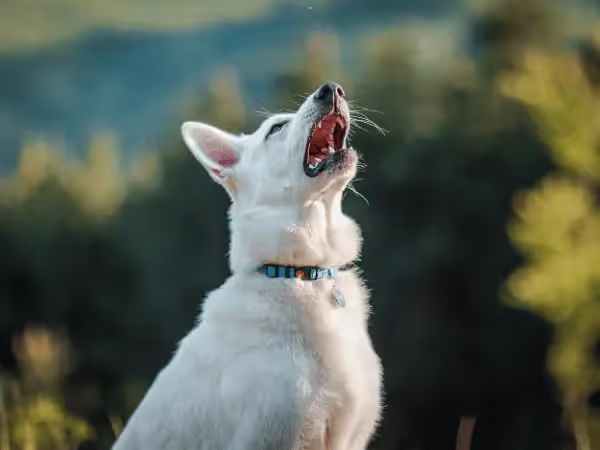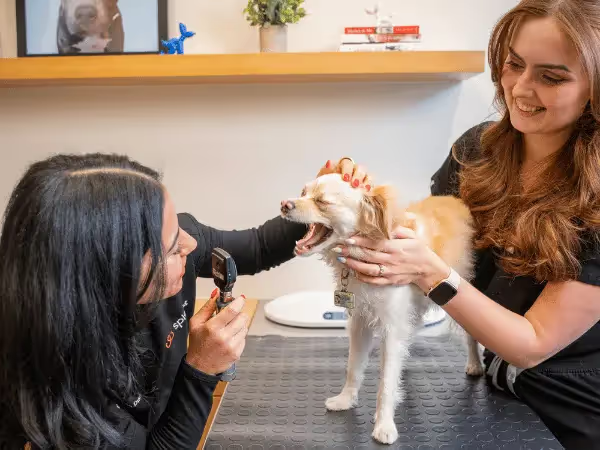If you’ve noticed your dog sneezing a lot, you may be wondering: “Why is my dog sneezing so much?” While occasional sneezing is normal, persistent sneezing may point to irritation, allergies, or even medical conditions that need a vet’s attention.
Understanding the possible causes can help you decide whether your dog needs prompt care. This Sploot Vets guide explores why dogs sneeze and when it’s time to see the vet.
Why Is My Dog Sneezing So Much?
A dog’s sneezing can be due to several reasons, ranging from excitement to underlying health issues. Let’s break down some common causes:
1. Excitement
Some dogs sneeze when they’re happy or playing. These ‘canine play sneezes’ are harmless and usually a sign of joy and communication during playtime. A strong indicator that a dog’s sneeze is due to excitement is if it almost always occurs when they are happy, playing, or anticipating something. However, when in doubt, ask your vet!
2. Foreign Objects in the Nose
Dogs explore their environment with their nose. Because of this, grass, dirt, or small particles can get into their nasal passages and cause irritation. Dogs may sneeze repeatedly in an attempt to expel the object.
If your dog is able to expel the foreign object, it’s typically a harmless situation. However, if you think your dog is struggling getting the foreign object out, contact a veterinarian for next steps.
3. Respiratory Irritants
Household cleaners, smoke, dust, or perfumes can irritate your dog’s nose. Just like in humans, sneezing is their body’s way of clearing the airways.
If your dog is sneezing due to environmental irritation, take them out of the space where the fumes, smoke, or dust is and try ventilating the area first before bringing your dog back inside.
4. Seasonal Allergies in Dogs
Dogs can develop allergies to pollen, mold spores, grasses, and other particles outside. Seasonal sneezing in dogs often comes with other symptoms, such as itchy skin, watery eyes, secondary dog eye infections, or nasal discharge.
- Learn more – Signs Your Pet Has Spring Allergies & What to Do Next →
- Learn more – Signs of Fall Allergies in Dogs & Cats & What to Do Next →

5. Upper Respiratory Infections in Dogs
Viral or bacterial respiratory infections in dogs can cause sneezing, along with other symptoms like dog coughing, nasal discharge, and lethargy. These may require prompt veterinary treatment, especially if symptoms worsen, as this may indicate the spread of the infection to the lower respiratory tract.
6. Canine Influenza
Canine influenza, or dog flu, is a highly contagious viral infection that can spread in kennels, dog boarding facilities, dog parks, and so on. Canine influenza can present with sneezing, along with other symptoms like coughing, lethargy, and fever. Because it’s contagious, a vet visit is important if canine influenza is suspected.
If you want to protect your dog from canine influenza, ask your veterinarian about the canine influenza dog vaccine. This vaccine is especially beneficial for dogs that socialize regularly or frequent dog-friendly spaces and establishments.
7. Dental Issues in Dogs
Infections in the teeth or gums, which can be a common dental issue in dogs, can spread to nasal passages, leading to sneezing in dogs. This is especially true for upper tooth root abscesses. If you notice sneezing along with bad breath, dental pain, or swelling below/around the eye, schedule a veterinary dental check-up.
8. Nasal Mites in Dogs
Nasal mites in dogs are tiny parasites that irritate the nasal lining and can be contracted from close contact with infected dogs. Nasal mites cause frequent sneezing, itching around the face, and nasal discharge. Seek prompt veterinary treatment to clear the infestation and provide relief.
9. Nasal Tumors in Dogs
Though less common, growths or tumors in a dog’s nasal cavity can cause persistent sneezing, bloody discharge, and breathing difficulties. Early diagnosis by a veterinarian is essential for the best treatment options.

When Should You Take Your Dog to the Vet for Sneezing?
While occasional sneezing isn’t usually a concern, you should contact your vet if sneezing is paired with any of the following symptoms:
- Prolonged sneezing – May signal ongoing irritation or infection.
- Lethargy or decreased energy – Suggests illness beyond minor irritation.
- Loss of appetite – Could point to infection or systemic illness.
- Nasal or eye discharge – Indicates possible infection or allergies.
- Bloody discharge from the nose – Can be caused by trauma, foreign bodies, tumors, or severe infection.
- Bad breath – Often linked to dental disease affecting the dog’s nasal passages.
- Facial or nasal swelling – May indicate infection, abscess, or growths.
- Difficulty breathing – A medical emergency in dogs that needs immediate care.
Note: Does your dog have any of these symptoms? We’re here to help! Sploot Vets is a provider of same-day urgent care and emergency vet services in Chicago, Colorado Springs, and Denver. Our vet clinics are open 365 days a year, with extended clinic hours (8 AM to 8 PM). Call our team for next steps→
Final Thoughts on Dog Sneezing
Most of the time, a dog’s sneezing is harmless, especially if it happens only occasionally or due to excitement. However, persistent sneezing or sneezing with other concerning symptoms should not be ignored. Knowing when to seek veterinary care helps protect your pup’s health and ensures they stay healthy and happy.

Sploot Vets: Your All-in-One Vet Care for Dogs
If your dog is sneezing a lot and you’re unsure why, Sploot Vets is here to help! Our all-in-one veterinary clinics in Chicago, Denver, and Colorado Springs provide comprehensive, top-tier care. Additionally, our Fear Free veterinary approach makes vet visits less stressful for dogs of all ages, from puppies to senior dogs.
Whether your dog needs a routine wellness checkup or urgent vet care for dogs, we’re open 365 days a year with extended hours to provide your pet the care they deserve.
Easily book a vet appointment online or via the Sploot Vets pet care app.






